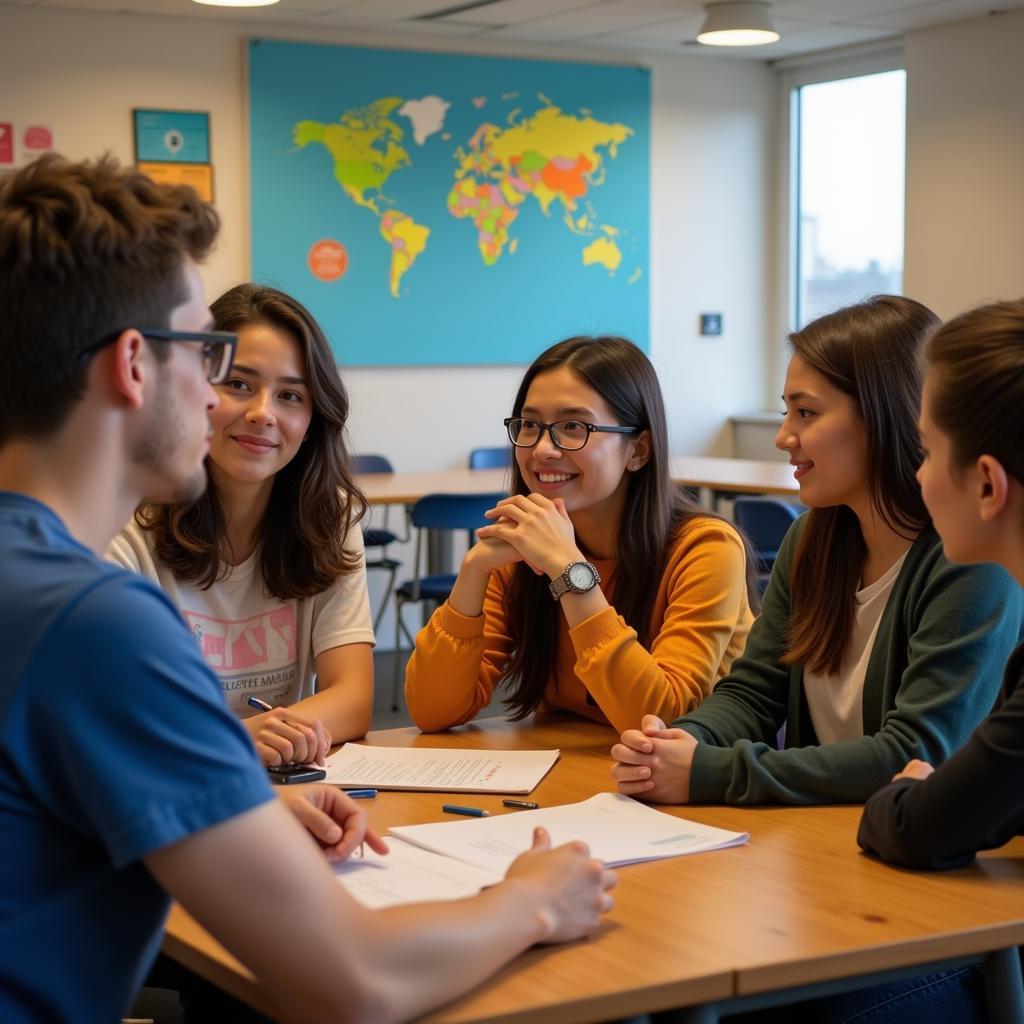An Educated Society is the bedrock of a peaceful and prosperous world. When knowledge flourishes, so too does understanding, tolerance, and the ability to resolve conflict constructively.
Education: The Cornerstone of a Peaceful World
Education is not merely about acquiring information; it’s about cultivating critical thinking, empathy, and the ability to engage in meaningful dialogue. These skills are essential for building bridges between cultures, fostering mutual respect, and dismantling the foundations of prejudice and discrimination.
 Diverse Group of Young People Engaged in Lively Discussion
Diverse Group of Young People Engaged in Lively Discussion
Breaking Down Barriers Through Education
One of the most powerful ways education promotes peace is by challenging stereotypes and preconceived notions. By learning about different cultures, religions, and ways of life, individuals develop a deeper understanding and appreciation for the richness of human experience. This exposure helps dismantle fear and mistrust, paving the way for greater tolerance and acceptance.
For instance, initiatives that bring together students from different backgrounds to collaborate on projects can have a profound impact. By working towards a common goal, students learn to value each other’s perspectives, appreciate their differences, and develop lasting friendships that transcend cultural boundaries.
Education: A Catalyst for Social Progress
An educated society is also better equipped to address the root causes of conflict, such as poverty, inequality, and lack of opportunity. When individuals are empowered with knowledge and skills, they can become agents of positive change within their communities.
Education can foster economic growth, reduce poverty, and create a more just and equitable society. This, in turn, reduces the likelihood of conflict and violence.
The Role of Critical Thinking in Conflict Resolution
Critical thinking, a cornerstone of quality education, enables individuals to analyze information objectively, question assumptions, and consider different perspectives. These skills are crucial for deconstructing propaganda, identifying misinformation, and engaging in constructive dialogue to resolve disputes peacefully.
Furthermore, education empowers individuals to become active participants in democratic processes. By understanding their rights and responsibilities, citizens can hold their leaders accountable and advocate for policies that promote peace and justice.
Investing in Education: Investing in Peace
Building a more peaceful world requires a sustained commitment to education. This includes ensuring access to quality education for all, regardless of background or circumstance. It also necessitates fostering a culture of lifelong learning, where individuals are encouraged to continuously expand their knowledge and perspectives.
By investing in education, we invest in a future where dialogue replaces violence, understanding triumphs over ignorance, and peace becomes the prevailing reality.
Conclusion
An educated society is not a utopia; it is an ongoing process of learning, questioning, and striving for a better future. By fostering critical thinking, empathy, and intercultural understanding, education empowers us to build bridges of peace and create a world where every individual can thrive.
Let us embrace the transformative power of education and work together to build a brighter future for generations to come.
FAQs about Educated Societies
1. How does education reduce violence?
Education equips individuals with critical thinking skills, enabling them to resolve conflicts peacefully and challenge ideologies that promote violence.
2. Can education really change the world?
Yes, education is a catalyst for social change. It empowers individuals, fosters economic growth, and promotes tolerance and understanding, all of which contribute to a more peaceful world.
3. What can I do to support education for peace?
You can support organizations promoting peace education, advocate for increased funding for education, and volunteer your time to tutor or mentor students.
4. Is education enough to achieve world peace?
While education is a vital component, achieving world peace requires a multifaceted approach addressing political, economic, and social inequalities.
5. What are some examples of education for peace initiatives?
Examples include conflict resolution training, human rights education, and programs promoting intercultural dialogue and understanding.
Need Help?
For assistance or more information, please contact us at:
Phone: 02043854663
Email: [email protected]
Address: Khu 34, Bắc Giang, 260000, Việt Nam
Our dedicated team is available 24/7 to provide support.
Explore More:
- Discover the influence of movies on society.
- Learn about the work of the Cedar Valley Humane Society in Iowa.
- Explore the inspiring contributions of Lin-Manuel Miranda to society.